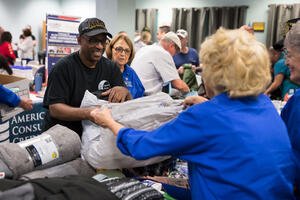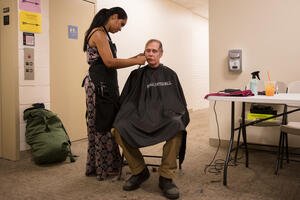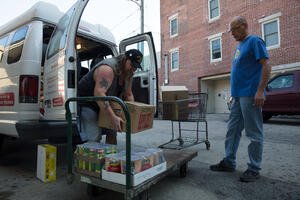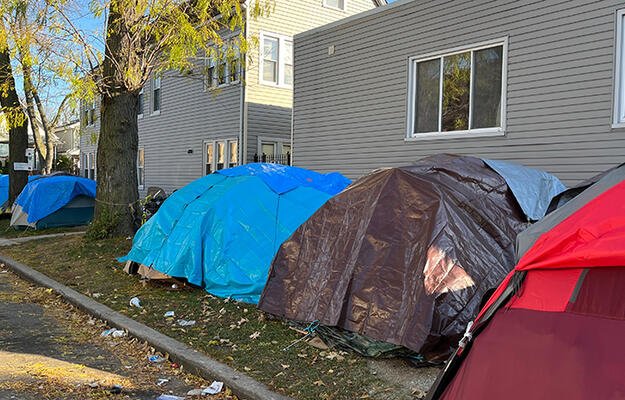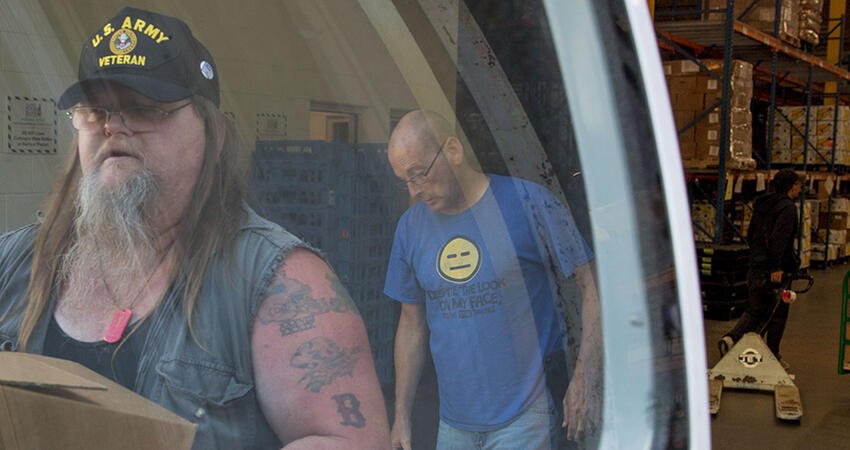
How to Win the War Against Veteran Homelessness
Writing by Emily Peiffer and photography by Lydia Thompson
When Nashua, New Hampshire, earned the designation of effectively ending veteran homelessness, Peter Kelleher’s first reaction was fear.
Kelleher, president and CEO of Nashua-based Harbor Homes, knew that reaching the goal in March 2017 didn’t mean the battle against homelessness was over. He wanted to make sure the city didn’t get complacent, as new obstacles could emerge in its efforts to house this vulnerable population. Despite that lingering fear, Kelleher takes pride in joining only a few dozen cities and states that have earned the US Department of Veterans Affairs (VA) distinction.
Harbor Homes, one of the nonprofits that helped the city reach that goal, holds the Annual Veteran Stand Down with that ongoing battle in mind. The event gives veterans access to food, clothing, and health screenings, and it connects them with local organizations that can help them secure employment and housing.
Harbor Homes holds the 11th annual Stand Down on September 28, 2017. (top) Volunteers at a booth run by VFW Post 10722 hand out coats and blankets to veterans to help prepare them for the upcoming winter. (left) Veterans can also get a haircut while attending the Stand Down. (right) Travel-size hygiene products sit on a table for veterans to take as they walk past.
Harbor Homes holds the 11th annual Stand Down on September 28, 2017. (top) Volunteers at a booth run by VFW Post 10722 hand out coats and blankets to veterans to help prepare them for the upcoming winter. (middle) Veterans can also get a haircut while attending the Stand Down. (bottom) Travel-size hygiene products sit on a table for veterans to take as they walk past.
As veterans walk into the Stand Down, they enter an expansive room packed with people and booths. Hundreds of volunteers offer supplies from socks to shampoo and chat with the veterans about their time in the service. Widows hand out coats left behind by their husbands as volunteers give haircuts to veterans and their young children in a nearby room.
“The Stand Down event just reaches out to the veterans and says, ‘The community is here for you, and we want to help you,’” said Nashua mayor Jim Donchess.
Veteran attendance at the Stand Down, now in its 11th year, continues to fall. But for the organizers, that isn’t a bad thing. Dwindling numbers means their broader efforts are working.
The partnership approach to ending veteran homelessness in Nashua—with support from city leadership and local nonprofits—has made the small New England town an example for other cities, as nearly 40,000 veterans remain homeless across the US.
Beyond the statistics: One veteran’s story
To earn the VA distinction, communities must identify all veterans experiencing homelessness, provide them shelter immediately, and help them secure permanent housing. “It’s not just a bunch of statistics,” Donchess said. “Each person is different.”
In Nashua, one of those people is Wade Thompson.
The 51-year-old joined the army immediately after graduating from high school in 1984 and served on active duty at Schofield Barracks in Oahu, Hawaii. After getting past the shock of transitioning from a New England to Hawaiian climate, Thompson said he adapted quickly to military life and enjoyed his time in the service. After four years in Hawaii, he had the option to either leave the army or continue in the same location. Because of what he called “island fever,” he decided his time in the service was over.
Back on the mainland, Thompson worked as a gas station manager, automotive part manufacturer, and hardware store employee. While working full time, he also volunteered as an emergency medical technician for the city of Farmington, New Hampshire. “I’ve always liked helping people,” Thompson said.
Thompson struggled with addiction throughout his life and found himself in a living situation that threatened to derail his sobriety. After Thompson told his doctor in 2015 that he was on the verge of being homeless, his doctor connected him with Harbor Homes. A week later, Thompson moved to the Dalianis House, a transitional housing facility in Nashua.
Thompson had never been to Nashua, and the idea of uprooting his life wasn’t easy. But the new structured environment helped Thompson maintain his sobriety and connect with fellow residents experiencing similar problems. After six months, Harbor Homes’ Veterans FIRST program manager Vanessa Pinciaro asked him to become a senior resident in the house. In this role, Thompson works one-on-one with residents and helps keep order in the house.
Nearly two years after moving into the Dalianis House, Thompson secured stable housing and moved in with his girlfriend. The two met online and had their first date at Dunkin’ Donuts. “We spent four hours sitting on a concrete curb just laughing and joking,” Thompson said. “We've been together ever since.” Although Thompson moved out of the Dalianis House, he continues to work there part time as a senior resident while working as a security guard in a nearby office building.
Thompson isn’t sure where he would be if he hadn’t connected with Harbor Homes. Before his doctor made the call, Thompson considered camping in the woods as his only remaining option. Now, three and a half years sober, in permanent housing, and with secure employment, Thompson has found stability. As he helped the Stand Down organizers throughout the day, he could give back to the organization that helped him reach that sense of security.
Reaching for zero: One organization’s journey to effectively ending veteran homelessness
Harbor Homes representatives said they had to learn—and continue to learn—that veterans are unlike other groups. “You have to sometimes not follow the prescribed script,” said Scott Slattery, Harbor Homes’ director of housing. “Meet the veteran’s need as opposed to trying to fit the veteran into your need.”
Harbor Homes operates by the Housing First philosophy and sees housing as the bedrock for physical and mental health. Kelleher, the nonprofit’s president and CEO, was Harbor Homes’ first employee in 1982 and now leads about 450 employees. Harbor Homes offers housing and health services to all groups in need. It launched its veteran-specific program in 2004 after a veteran’s body washed onto the shore of the Nashua River.
Between January 2005 and October 2017, Harbor Homes moved 1,071 veterans into permanent housing and helped 998 find employment.
“I look at it as our duty,” Pinciaro said. “These guys are trained to go into the military, they do whatever they do there and deal with whatever they've dealt with, and there's no training on them getting out. So how do you get out and just function?”
Veterans are more likely to need substance abuse and behavioral health services, as well as employment supports and help securing long-term housing, Kelleher said. “They need to feel part of something larger. The more they can be connected with the social fabric of the community, the better chances of a good outcome,” he said.
Harbor Homes administers several federal programs, including the US Department of Housing and Urban Development Veterans Affairs Supportive Housing program for permanent housing; the VA Homeless Providers Grant and Per Diem Program for transitional housing up to two years; the VA Supportive Services for Veteran Families program for case management and financial assistance; and the US Department of Labor Homeless Veterans' Reintegration Program to help veterans find jobs.
The organization’s main goal for any homeless veteran is to respond as quickly as possible to secure them shelter and then ultimately move them into permanent housing. “It's a holistic approach, getting a veteran when they're first homeless literally coming in off the street with a backpack to culminating with permanent housing, employment, and likelihood of sustainability,” Slattery said.
Harbor Homes takes a collaborative approach to combating homelessness, as the organization is part of the Partnership for Successful Living, a coalition of six nonprofits that operate under the same board and CEO. These nonprofits offer services from home health care to substance abuse treatment to mental health counseling. Kelleher said the partnership, created nearly a decade ago, aims to be a place “with no wrong door when people come in with five or six needs at the same time.”
Slattery added, “Lots of communities and nonprofit groups operate in silos. We have to work together. It's the only way that we're going to make any kind of difference.”
Sharing success: One city’s efforts to set an example
Along with rapid response efforts and a focus on permanent housing, Harbor Homes executives emphasized another key to ending veteran homelessness: support from city and state leadership. Mayor Donchess and former New Hampshire governor and recently elected senator Maggie Hassan were integral to Nashua reaching the VA distinction and served as an “anchor point” for all stakeholders, Kelleher said.
The years-long effort involved weekly phone calls between state and local leaders and nonprofit groups. In each call, they discussed the situation of every homeless veteran they were aware of and attempted to find a solution. Finally, in March, Nashua reached the point where it “does not have any veterans who can be located who are homeless,” Donchess said.
Donchess has traveled to other cities to speak about the city’s approach to reaching an effective end to veteran homelessness. He also participates in the Stand Down event each year, addressing the crowd and chatting with volunteers and veterans. He knows they’re all working toward the same goal.
“Veterans have served our country and our community and have sacrificed a lot for everyone,” Donchess said. “We want to send a strong message to our veteran community that there are people in the community who care deeply about their welfare and who will be available to help when they need it.”
Header image: Steven Callahan (left), a resident of Dalianis House, and Wade Thompson (center) load food from the New Hampshire Food Bank into a van to take back to Harbor Homes in Nashua.
